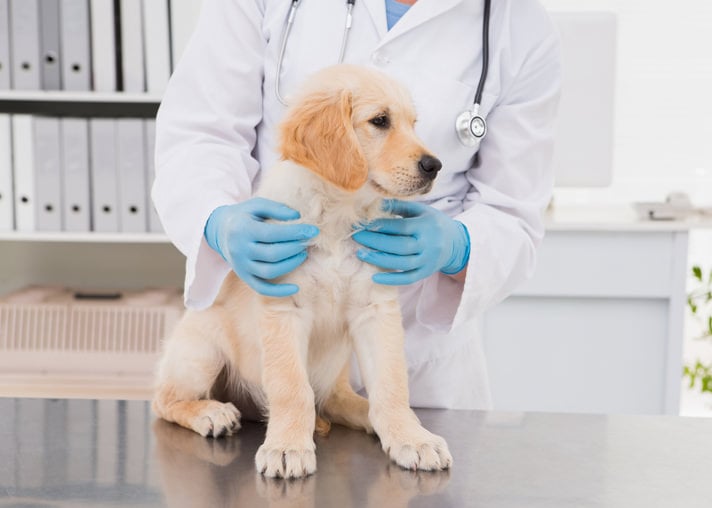As part of our comprehensive new puppy wellness examination, we veterinarians spend a great deal of time asking questions to best understand as much as we can about your new puppy. We ask questions about all aspects of how the animal is cared for as well as questions relating to behavior, the relationship in the family, etc. We also routinely answer a myriad of questions from the pet owners. I do believe there is no bad question — only those that goes unasked.
Whether you are a seasoned dog owner or this is your first puppy, there are always several topics that should be covered. Here are 15 questions you should ask your veterinarian during your puppy’s next visit.
1. “Could my puppy have any diseases?”
While you always want to do your due diligence in selecting a puppy — and I do not recommend acquiring any pet on impulse — there is always the possibility that your seemingly healthy puppy could be harboring an illness. I wouldn’t imagine that puppy providers knowingly supply sick dogs, but puppies often come from the shelter, pet store or even breeder infested with one or more types of gastrointestinal parasites that may not immediately be evident in terms of causing digestive tract upset (decreased appetite, vomitting, diarrhea, etc.).
Along with a thorough external exam for fleas and other ectoparasites (skin parasites), performing a complete fecal evaluation for common parasites is a crucial part of a new puppy’s first consultation with a veterinarian. Your puppy may also come with other gastrointestinal tract, skin or respiratory issues, so that initial exam is very important to properly and thoroughly evaluate your pup. The sooner a problem is recognized, the quicker treatment can begin. If a problem is found, you’ll want to notify the supplier of the puppy as siblings or other puppies may be affected, too. And some pooches may come with a limited guarantee.
Sometimes, when there is no prior history of deworming, we may suggest at least a short course of a broad-spectrum dewormer to kill parasites that may not yet be causing clinical signs or are not plentiful enough in feces to be found on diagnostic testing.
2. “How often should my puppy be examined by a veterinarian?”
We veterinarians are trained to identify the many subtle signs of illness, which may not be apparent to the average dog owner. So, it is very important that the more experienced hands and eyes of a veterinarian evaluate your puppy on a frequent basis.
The puppy wellness plan at my practice typically involves examinations with a veterinarian every three to four weeks during the puppy’s first 6 months of life so that vaccinations can be given and other needed diagnostic testing (fecal evaluation, etc.) and treatments (deworming, etc.) can be performed. We also discuss all other aspects of puppy wellness, including behavior and nutrition, during these visits. As puppies mature, we recommend they come in for wellness exams twice per year. During a wellness visit, your dog will be examined physically, which includes listening to his heart and lungs, physically evaluating him via palpation (touching) and examining his eyes, ears and teeth. This may also include the administration of vaccinations. Two times per year may sound like more than you are used to, but considering that dogs age faster, it is like you going to your physician every three to four years. Significant changes can occur during that time, and that is why we recommend the twice-a-year wellness exams. By scheduling more frequent physical examinations, wellness plans can be more readily tailored to your dog’s needs as they mature, and illnesses can be diagnosed and treated before they become severe.
3. “How can I prevent my puppy from getting injured or sick?”
Just as with children, consistency and discipline are necessary to ensure puppies develop into well-behaved adults who are pleasant to be around and can acclimate to the stressors of everyday life. I believe that training should begin as soon as you get your puppy, regardless of age. Basic guidance, like getting your dog’s attention with a treat, can start on Day 1. Once you have your puppy’s attention, you can work up to having him sit, stay, come, lie down, walk on a dog leash and perform other necessary actions by using positive reinforcement. The best way to avoid trauma and illness is by having your dog stay under close observation and within the confines of a short lead (i.e. non-retractable leash) or demarcated space (dog crate, gated room, etc.) so that dietary indiscretion (eating something one should not), escaping, or less-than-friendly interactions with other animals (including wildlife) do not have the potential to occur.
I recommend all dog owners — and especially new puppy parents — seek the guidance of a reputable dog trainer to ensure that the most appropriate training techniques are being implemented. Good behavior exhibited by a well-trained dog fortifies the owner-companion animal bond and will have positive ramifications for life.
4. “When will my puppy be housebroken?”
That depends on the puppy and consistency of training. We find that most puppies will be housebroken before 6 months. If by the time the puppy is 4 months old there is little progress in the housetraining, it may be time to seek professional advice — ideally from your veterinarian or a credentialed dog behavior professional.
5. “When will the barking and howling at night stop?”
Typically, the nighttime crying, barking and howling puppies do almost always subsides within a few days of arriving in their new home. There are several things that can be done to help ease this transition from being with littermates to being alone. For example, you can provide him with soft blankets or stuffed animal dog toys.
Some puppies may continue to whine during housetraining as they still need to go to the bathroom in the middle of the night. However, if your puppy is just vocalizing to get you up to play, then it is time to stop indulging him and teach them to sleep through the night.
6. “Do I need to vaccinate my puppy?”
I am aware of the controversy concerning whether or not children should get vaccines. Because of this, some pet owners also question whether their puppy needs to receive vaccines. But just like in humans, we are fortunate to have vaccines as they provide immunization against many diseases.
The immune systems of dogs and cats respond differently than ours, and not vaccinating dogs has and will lead to significant canine health problems. In my city, rabies vaccination is required by law, and there are several other vaccines that veterinarians recommend on a routine basis.
During the initial examination, your veterinarian can present to you the safest immunization strategy for a developing dog depending on a variety of factors, including the puppy’s age, when the puppy was weaned (stopped nursing from mom), the previous vaccination history, and the current health status. In veterinary medicine, we are fortunate to have vaccinations that prevent infection of specific viruses and bacteria that can be safely administered under our guidance. The “core” vaccinations are those that can protect against infection with fatal diseases (distemper, parvovirus, leptospirosis, rabies, etc.). The “non-core” vaccinations help defend against non-fatal but still significant diseases (Bordetella, lyme, etc.).
Ideally, puppies should only be vaccinated when they are not currently battling other underlying illness (gastrointestinal parasite infestations, respiratory tract infections, etc.). To monitor the immune status of your pup when he has been vaccinated, immune system proteins (antibodies) can be checked by performing an antibody titer (VacciCheck, etc.) and this will ensure that the vaccination series has achieved the intended goal of producing immunity.
Another thing to keep in mind: In addition to protecting your dog from disease, you can help control the spread of the disease to other dogs. So what is good for the individual pup is also benefiting the overall dog population in decreasing the spread and outbreak of disease.
7. “Do you think it is important that I give my pet parasite protection medication and why?”
We have found that no matter where you live, preventative medications that protect your pet from parasites are essential. Parasites, such as heartworm, can infect both dogs and cats (though primarily dogs) and cause health issues, including lung disease, heart failure and damage to other organs. Other parasites, such as nematode worms, commonly infect dogs, but can also infect people.
Children are more vulnerable to infection since they can come into contact with soil in playgrounds or sandboxes that are contaminated with infected dog or cat feces. If the contaminated soil is ingested — which can easily happen when your kids play in a sandbox and then puts their hands in their mouth before washing them — the nematode larvae can cause serious problems, including blindness. So by making sure your pet is on parasite medication, you are helping to reduce the presence of parasites in the environment, which will ultimately not only protect your dog from disease, but also other dogs and cats as well as your family and others by decreasing the potential for contact with parasites.
8. “Is there one best food to feed my puppy? If not, what do I need to know about proper pet nutrition?”
I have a strong interest in nutrition, and the staff at my practice spend a great deal of time discussing nutrition and what is best for the individual patient. A puppy’s rapidly growing body needs plenty of nourishment to promote consistent growth. Providing your puppy a quality diet will promote a healthy life.
Though veterinarians may make specific food recommendations, it’s not always easy to match dogs with specific diets due to availability. We do not recommend choosing a dog food just because of its packaging. It is very important, as with our own food, to look at the ingredients. Ideally, we like there to be real ingredients — chicken, beef, fish — that you can easily identify. Avoid any animal by-products, preservatives and additives. Once your dog is on a particular food, we recommend owners pay close attention to how he reacts after eating the food, such as whether or not there is diarrhea or itchy skin, which can be a sign of a food allergy.
Puppies typically need higher levels of protein, fat, overall calories, certain vitamins and minerals, and other nutrients compared to adult dogs. Also, the percentage of the ingredients in a puppy’s meal needs to be in an appropriate balance to promote healthy growth and not cause rapid weight gain, which can lead to a puppy becoming overweight or obese and developing subsequent orthopedic problems (arthritis, intervertebral disc disease, ligament tears, etc.).
Based on veterinarian’s assessment of your young dog’s body condition score (BCS) and weight, an appropriate guideline for daily caloric intake can be established. Typically, puppies have a need for and ability to consume more calories than their adult counterparts due to their faster metabolic rates. Calories from meals and dog treats should be restricted after a puppy is spayed or neutered or with breeds prone to weight gain.
Proper nutrition is one key to maintaining ideal health in our patients, and we feel it is very important to make sure that our clients have a good understanding of what is involved.
9. “How often should I feed my puppy?”
I don’t recommend free-choice feeding (leaving food out all the time), as this can lead to your dog carrying excess weight in his adulthood or senior years. I do recommend feeding puppies multiple meals per day, typically three or four depending on their activity level.
Additionally, as puppies are learning the ropes of acceptable behavior, food can serve as a powerful motivator to reinforce positive training techniques.
10. “Do you think my puppy’s weight is healthy? If not, why and what should I do?”
We weigh every pet who comes into our clinic because we feel it is very important to monitor weight. We also spend time discussing the pet’s weight as it relates to his body condition score (BCS).
The BCS is an evaluation of the pet’s weight in relationship to his body type. We score it on a scale of 1 to 9, with 5 being ideal and anything above being heavy and anything below being light. Though we all love to show our pets how much we care for them by giving them treats, those extra calories can really add up, especially if the pet is not getting appropriate exercise. There are times when it may not be obvious that your pet is overweight — and that is one reason why we always measure the weight and discuss BCS.
Ideally, you should be able to feel your dog’s backbone and ribs. If you cannot feel his ribs without pressing deeply into the skin, your dog is carrying around excess fat. That extra weight will put additional pressure on his joints and may increase the risk of liver problems and possibly diabetes.
To help your pooch trim down, your veterinarian likely will recommend your dog eat healthier, including smaller portion sizes and no people food, and increasing the amount of exercise your pet gets.
11. “Is it important to provide care for my pets teeth? Why? How do I do it?”
We recommend that people get their puppy used to a tooth brushing routine as soon as possible. Granted, in young puppies, there will be a lot of teething and chewing as the baby teeth fall out and are replaced by adult teeth. But it is always good to get them used to having dog toothbrushes in their mouth and brushing their teeth.
As in people, regular professional dental cleanings are important to maintain your pet’s health. These cleanings remove plaque and tartar from your pet’s teeth to prevent periodontal disease. People often joke about “dog breath,” and though a dog’s breath is normally not be the best, significant halitosis is a sign that your pet’s gums and teeth need attention.
Your veterinarian can discuss and demonstrate routine dental care at home using brushing and rinses. However, in our busy lives, many times this is not done, so a proper dental cleaning in the clinic may be required.
Proper dental care will hopefully help your pet stay one step ahead of dental problems and save them from even more significant health issues in the future.
12. “Will I need to learn to clip his nails and clean his ears?”
Along with brushing your puppy’s teeth, it’s important to get your puppy used to having his feet and ears touched. That way, if and when they need to have their feet or ears examined, the process does not seem to foreign to them.
Likewise, practicing clipping your puppy’s nails and/or cleaning his ears will help familiarize him with those procedures.
13. “When should we spay her/neuter him?”
Typically, most veterinary facilities recommend pets to be spayed or neutered before they reach sexual maturity. If the goal is to keep them from reproducing, any time sterilization can be safely accomplished before they contribute to the overpopulation is the right time.
In general practice, 6 months of age is the most commonly recommended time for sterilization, though shelters tend to spay or neuter dogs earlier. However, recent research has shown that in certain breeds, there may be advantages to waiting. It is best to talk to your veterinarian about what is best for your puppy.
14. “Should I microchip my puppy?”
I recommend having a microchip placed under the skin of your puppy as a means of permanently identifying your pooch. My clinic is contacted daily by people having lost their dogs, and the microchip is an excellent way to help reunite lost dogs with their families. The procedure is similar to giving a vaccine and can be done at any time.
15. “What is pet insurance, and does it work?”
There are several providers of pet insurance and, just as with our own insurance, you have to find the provider and plan that is best for you and your situation. Your veterinarian should be able to provide you with information about which pet health insurance companies they may use or recommend.
I’ve only scratched the surface with these 15 questions. Maybe now, however, you’ll be able to steer discussions with your veterinarian in a way that will get the rest of your questions answered.
Want to read more? Check out:
- How to Stop Submissive Urination in Puppies
- Best Pet Supplies For Puppies
- Food and Treats That Are Perfect for Your New Puppy
By: Dr. Byron de la Navarre
Featured Image: Wavebreakmedia/iStock/Thinkstock
Share:









